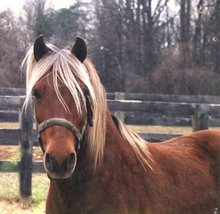
Years ago I heard the father of one of my students say that watching his daughter ride dressage was like watching paint dry. Not one to let a teaching opportunity slip past me, I asked him if he knew the origins of dressage, and if he understood what the point was, and where it's place was in both military and equestrian history. Of course, he looked at me dumbfounded like he'd been caught making a sexist comment in front of a feminist. I may not be a "classic feminist", but I do understand and appreciate the benefits of dressage training.
Over two thousand years ago the ancient Greeks knew that in order to use their horses to their best advantage in battle, they must be in perfect condition, and be completely obedient to the will of the rider. The soldiers lives depended on it.
With their appreciation for the laws of nature and physics, the Greeks knew they had to be able to use the horse's natural athletic abilities to move quickly from side to side, to dodge a sword swung in their direction, to jump from one place to another, to change direction in an instant, to halt, then burst forth at full speed without any challenges or hesitation from their mounts. And they needed to be able to accomplish this with the simple shifting of a seat bone, the tightening of a calf muscle, or the closing of one finger on the reins. The first published papers on this type of training came from the Greek Commander Xenophon, born in 430 BC. See http://horsemanship.suite101.com/article.cfm/xenophons_the_art_of_horsemanship
The movements that we see today in dressage competitions come from these same military maneuvers. It is an exacting science, and one that only years of training result in the desired precision of movement. All other disciplines of riding, whether jumping, barrel racing, polo, reining or pleasure riding, benefit from dressage training.
A horse that is schooled in dressage will be more supple, will use it's own body more naturally in collection, will develop stronger muscles, healthier heart and lungs, and be more obedient to the rider. Any horse, whether one involved in some sort of competition, or your trail horse you canter through the woods, will be a better mount, and will be more athletic, with even a very basic level of dressage training.
If you want to see what this looks like in person, and get a better understanding why it was so important to the military, I recommend spending an evening at Medieval Times (www.medievaltimes.com) You will enjoy a dinner worthy of any Middle Age court, and see competitions and demonstrations of such magnificent movements as piaffes, tempi changes, passage, half-pass and pirouettes.
For more detailed information about dressage, go to http://www.usdf.org/about/about-dressage/history.asp or http://www.schumachersporthorses.com/history_of_dressage.htm. These web sites will give you a lot of valuable information about the important history and use of dressage in today's equestrian sports.
Oh and that Dad? He started taking riding lessons the next week, and today owns a small farmette where he keeps his own stable of horses.

No comments:
Post a Comment